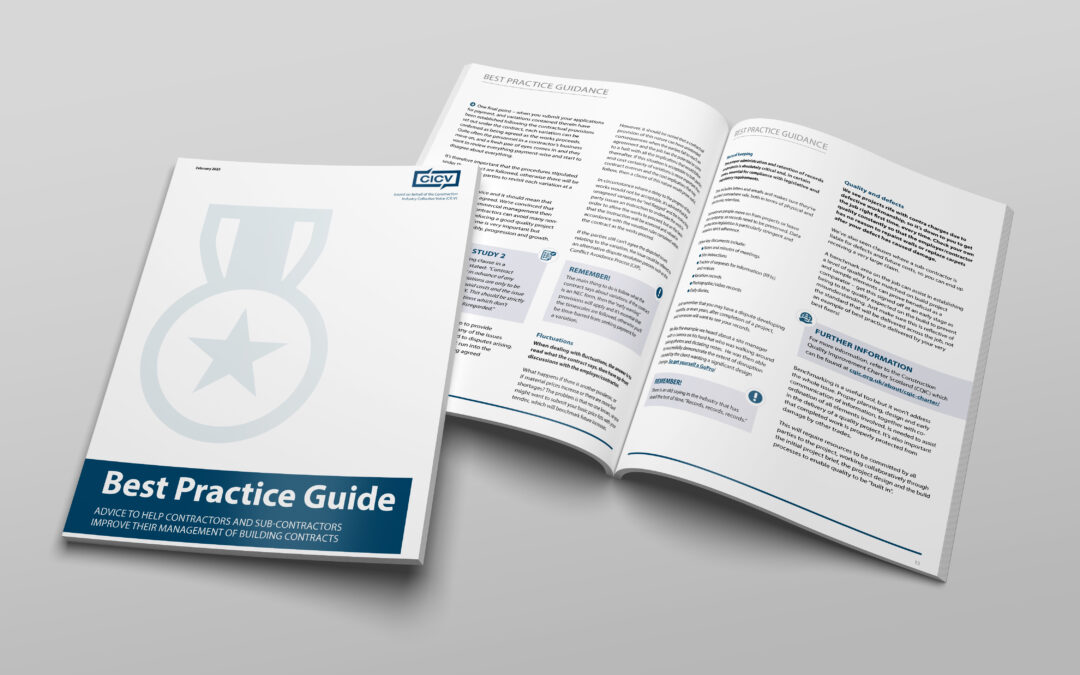The Construction Industry Collective Voice (CICV) has followed up the results of its recent payments survey by issuing a new Best Practice Guide to help contractors and subcontractors improve cashflow and prevent costly and damaging disputes
Compiled by more than a dozen industry experts, the in-depth guide offers a wealth of practical information, demonstrating how to take control and proactively deal with a range of issues to enhance the entire contractual chain.
As part of its mission to improve the sector, the open source publication is being supported by an upcoming webinar on Friday 3 March that will see experts from the CICV talk through the guide and offer further insights into preventing financial disagreements.
Both resources have been produced in response to last week’s CICV survey on payment and cashflow issues in the industry in Scotland, which revealed that businesses are still suffering the scourge of late payments, outstanding retentions and unexpected charges.
Iain McIlwee, FIS Chief Executive said:
“It has been great to work colleagues from across the CICV to develop this guidance. It is vital that the supply chain becomes more contractually aware and fully understands the risks they are being asked to carry. This document is something every contractor should use to ensure that they and their teams are contractually aware and making good decisions. It is a great training tool too for those joining the sector. The CICV is an amazing force for good and we are very proud to be part of it.”
Industry consultant Len Bunton, who is Chair of the CICV Pipeline and Commercial sub-group, said:
“Following the recent CICV survey, we concluded that the contracting supply chain needed some guidance on improving the commercial management of projects.
“Our highly-experienced contributors have walked through the construction process, giving their best recommendations on how to do things better day-to-day. A lot of the problems we deal with are self-inflicted, so we have gone back to the basics of improving the way in which commercial activities are carried out.
“This is not rocket science, but it’s clear the whole process needs a massive shake-up. Following publication of the guide and our webinar to take the supply chain through it, I am confident we can get change into the UK industry.”
As the latest initiative from the respected industry body, the Best Practice Guide is free to download from the CICV website and looks at a number of areas of interest, including:
- Tender qualifications
- Contract amendments
- Payment schedules
- Payment applications
- Payments received and value
- Variations
- Retentions
- Fluctuations
- Notices
- Record keeping
- Quality/defects
- Conflict Avoidance Process (CAP).
The guide has been drawn up by experts from a range of industry bodies, including Mr Bunton, Finishes and Interiors Sector CEO Iain McIlwee, Scottish Building Federation Commercial Director Ian Honeyman and the National Hub Programme Director of Scottish Futures Trust, David MacDonald.
Mr Honeyman said:
“Agreeing a mutually beneficial and collaboratively agreed contract is the first, vital stage in any construction project, and an area in which can lead to costly and damaging disputes.
“The CICV has therefore looked at the most common reasons for payments being delayed and changed, and has prepared this guide to help companies and individuals understand how to avoid them.”
CICV Chair Alan Wilson, who is also Managing Director of electrical trade association SELECT, said:
“Being paid on time and receiving what you’re due in full is essential for the survival and growth of every business, so this guide and accompanying webinar will help contractors and sub-contractors improve the commercial management of building contracts.”
The Best Practice Guide and webinar are the latest in a string of practical and constructive initiatives launched by the CICV since its creation as the Construction Industry Coronavirus (CICV) Forum in March 2020.
Made up of 28 trade associations, professional services bodies and companies, it has maintained a steady supply of information and practical advice to the sector as well as carrying out surveys, producing animations and posters, hosting webinars and maintaining close dialogue with Scottish Government ministers.
The CICV Best Practice Guide can be downloaded here and you can register for the upcoming webinar here.


